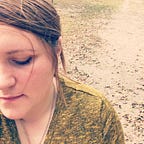The Spectacular Loneliness of Being a Foster Parent
You can’t understand these losses unless you live them.
I’ve never been someone who has had a lot of support in their life. My own childhood was messy and rocky. While I have an older half-brother, I was raised separately from him, leaving me the only child of a single mother until my mom remarried. I learned quickly how to raise myself.
I was the queen of pretend play. In third grade, I took the tiny bouncy balls that I got from the vending machine at the laundromat and created my own “bouncy ball school” where I’d send the balls to learn how to properly bounce. Some of the balls were instructors; some were students. When a ball went missing, I made a missing person flyer and hung it on the door of my classroom. My teacher was furious and told me to take it down. Teachers were rarely kind to me. I was always too much. I was too creative, too sensitive, or too quiet. Later, in high school, I was too dramatic or too intense. At one point, I was even too clinically depressed. I lost friends. I wanted to become a movie star; I wanted to escape.
When my spouse and I decided to foster, we made the choice for reasons that are both obvious and not-so-obvious. The obvious reason is that it was going to be difficult and expensive for us to have children biologically. The less obvious reason is that I’ve spent my entire life relating to foster kids. I know what it’s like to be without half of your family. I didn’t even know that I had a brother until I was 7 years old. I know what it’s like to attend four different elementary schools for first grade. I know what it’s like to feel really, truly alone.
What I didn’t expect when we first started fostering was that this path would be a continuation of this pattern of loneliness in my life.
In a normal situation, when you bring home a new baby, family and friends come over to shower you with presents and love. When we brought home our newborn foster daughter, fresh from the NICU, we were greeted by an empty apartment. Family didn’t stay over to help us care for this brand new baby. Instead, Google was my best friend. At 28, I was a new mother, but not really, because I wasn’t technically a mother at all.
I read something later that stressed the importance of a village when caring for a newborn. But, what village? We were only foster parents. Even if my mother offered to help, I often turned her down, wanting to protect her heart from getting too attached.
Our newest foster daughter, Leia (not her real name), turns one today. A few nights ago, we got some news about her future that I found upsetting, so I’ve been rather emotional. The whole thing is bringing up memories of how our previous foster daughter, Jessy (also not her real name) — who we had from birth to nearly age two— left. I can see now why I’ve heard of foster parents not accepting new placements that are similar in age to the one that just left the home. It’s strange to be throwing a first birthday party when we threw one a year ago for another child who is now no longer here.
This is foster care; this is how it goes. My heart, however, just doesn’t understand.
I think that all parents must feel lonely, but foster parenting is a special kind of lonely because so few people really understand what you’re going through. You can’t understand these losses unless you live them. You also can’t understand the mental load of scheduling home visits with advocates, social workers, and lawyers. There are court dates and emails with birth families where I try so hard to be comforting and compassionate. Most families don’t have a binder filled with summaries from every medical appointment for their children or a special collection of memories called a Lifebook, but we do. There are training dates for us and therapy evaluations for the kids. Because of new Covid regulations, we currently have to seek approval from four different people just to take the child that we’re raising on an out-of-state trip to the zoo. It is lonely. It is so terribly lonely.
People seem to think that foster families are somehow different from other families. The truth is, our family is just like any other family — but with less support and understanding. When I’m asked now what advice I’d give to other foster parents, I stress over and over the importance of making sure you have a support system.
And, if you know a foster family? Give them a call. Give them a hug. Bring them breakfast and sit with their kids for a while. Be the village.
We all need a village.
